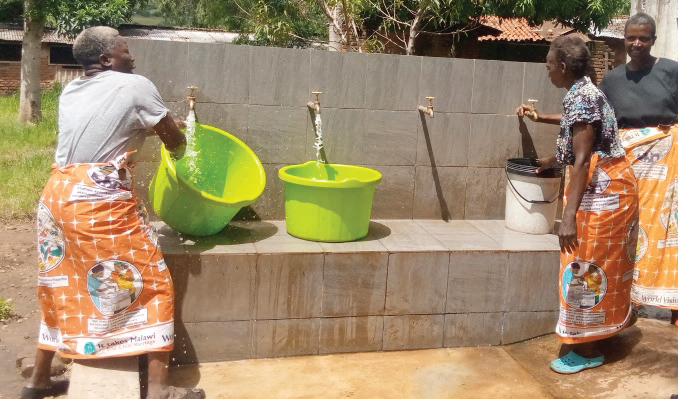Like most women from James Kanono Village in Chiradzulu, Martha Meleka used to leave her home at 3am to get water from Mwanje River.
Everyday, Meleka and her two girls endured long tiring trips to get murky water for home use such as drinking, cooking, bathing and washing dishes.
Women collect water from a kiosk
The 54-year-old woman says they could fill their buckets around 9am.
She recalls: “The river has been the only source of water, so this used to force us all of us to flock there.
“We had to leave very early in the morning before goats, pigs, cattle and wild animals contaminated the water.”
Meleka lost almost six hours collecting water on daily basis, time best used to take care of her family, crops and income-generating activities.
“It was a burden and I had limited time to take care of my family. I could not do businesses or meaningful life activities,” she states.
The United Nations (UN) reports that an ever-growing Malawian woman normally spends 54 minutes to collect water.
This is against the first step to ensure everyone accesses the vital utility within a 30-minute round trip, according to Sustainable Development Goal (SDG) six on ensuring universal access to safe and affordable drinking water by 2030.
Another woman, Maria Simati, says the situation fuelled gender-based violence by partners suspecting them of cheating.
“We could leave them while fast asleep and return after six to seven hours. They barely buy our explanations and most women could be beaten for coming home late,” she says.
The 50-year-old woman in Kavina Village, who relied on Napolo or Mtayamwana rivers for water, says lengthy and multiple trips to the water sources affected children’s development and rights, especially of girls.
The girls usually came back home around 10am, making them report late for classes or be absent. This also contributed to high girls’ school dropout rate in the area.
The dirty water aggravated the communities’ vulnerability to waterborne diseases such as cholera and diarrhoea in this part of Traditional Authority (T/A) Mpama.
Mary Mola of Liwaya Village says diarrhoea, typhoid and cholera were common among the people, especially children.
The old timer says children used to get sick often and most households spent their little incomes on frequent hospital visits.
However, the lengthy tiring trips in search of water and waterborne diseases are history in the area.
This follows a water, sanitation and hygiene (Wash) project of World Vision Malawi (WVM) that has brought safe tap water close to the people’s homes.
In 2020, the child-centred Christian organisation constructed a solar-powered water supply system from a borehole it drilled on the foot of Lisawo Hill.
This includes the construction of nine water kiosks in six villages, namely Kavina, Liwaya, Mpama, James Kanono, Mpochera and Mitepa. The communal water points serve over 3153 people with clean water.
About 1233 and 50 learners and students at Mbulumbuzi primary and secondary schools, respectively, also benefit from the intervention meant to promote sanitation and hygiene.
Meleka says now she has more time to take care of her family.
“The safe water kiosk is near. I manage my home well because I do not waste time walking long distances to get water,” she says with a smile.
Simati says peace is prevailing in homes with the improved access to water.
“We are doing household chores in time, giving us enough room to engage in income generating activities and be with our husbands,” she says.
Mola adds that children are enjoying their right to education and health.
“The enhanced sanitation and health have brought inner peace as children are healthy,” she says. “Girls are liberated as they spend more time in school and on academic activities.”
Group village head (GVH) Nsomera commends the organisation for improving their lives.
He says: “We have a bright future because the intervention has made the environment safe for children to spend more time in school than bedridden with waterborne diseases.”
The local leader says he has developed by-laws to protect the kiosks so that they serve them for a long time.
Bamusi Pirima, WVM Chiradzulu Wash development facilitator, says the intervention complements their efforts of promoting good health and well-being for children.
He says: “We strive to provide safe environment for children to achieve their full potential. The initiative has reduced diarrhoea cases, helping them to grow fully.”
The improved sanitation and hygiene also contributed to the open defaecation free status the area attained in 2021.
The post Improving access to clean water for good health appeared first on The Nation Online.
 Moni Malawi
Moni Malawi 

